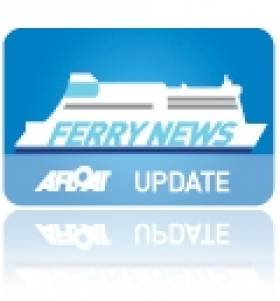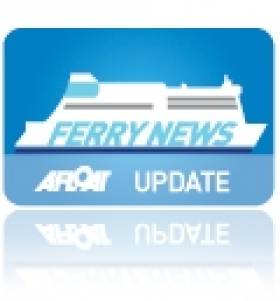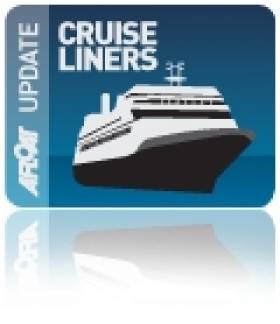Displaying items by tag: Port of Dover
Port of Dover Records Busiest Freight Year
#DoverFreight - The Port of Dover in 2014 recorded its busiest ever year for freight, with 2.42 million freight vehicles handled, writes LloydsLoadingList.
Europe's busiest port achieved a growth of 9.7% this year when compared with 2013 which was 2.5% higher than the previous record of 2.36 million set in 2007.
The performance of the port has been seen as a barometer of the UK economy, particularly through the freight vehicle volumes that arrive by road from across the UK and mainland Europe.
Port of Dover CEO Tim Waggott said: "If you want to see how the UK economy is doing, come and see what is happening at the Port of Dover. We are smashing records whilst rebuilding parts of the port in order to provide new infrastructure that will support further anticipated growth in the years to come. In effectively handling such volumes of UK trade, the port is establishing itself as a national economic success story."
For more stories visit Lloydsloadinglist.com
P&O Ferries Protests Over Eurotunnel Bid to run French Ports
#StraitofDover– Dover's largest ferry operator P&O Ferries have written to the UK Office of Fair Trading, expressing concern over Eurotunnel's inclusion in a final round process to manage French shortsea ports Calais and Boulogne.
The Channel Tunnel operator's move could lead to 'substantial lessening of competition' in shortsea services between the UK and France.
Chief executive of P&O Ferries, Helen Deeble, said a successful bid by the Channel Tunnel operator could lead to a "substantial lessening of competition" in shortsea services between the UK and France.
Calais and Boulogne, owned by the Nord Pas de Calais Chamber of Commerce, comprise two of the three French shortsea ports serving ro-ro traffic out of the UK.
Ms Deeble, who is also the current president of the UK Chamber of Shipping, said a successful Eurotunnel bid would amount to a "relevant merger" within the Enterprise Act 2002, providing grounds for the OFT to investigate.
P&O Ferries, owned by Dubai World, further argues that the ports of Calais and Boulogne "would cease to be distinct from Eurotunnel" and that £70m ($109.8m) of UK derived turnover would be acquired by Eurotunnel.
As a result, said P&O Ferries: "More than 25% of France-based French sea port services for ex-UK ferry traffic is or will be provided by a single entity, Eurotunnel."
For much more on this story Lloyd's List has a report.
Over 100,000 Cruise Passengers Visit Port of Cork in 2010
2010 proved to be another busy year for the Port of Cork with a total of 52 cruise liners calling to Cobh, Ireland's only dedicated cruise berth.
Onboard the 52 cruise liners were a total of 100, 414 passengers and crew, a record number to visit Cork.
Following the Port of Cork's investment in Cobh's dedicated cruise berth over the last five years, some of the largest liners in the world are now capable of berthing, bringing with them thousands of passengers and crew, all of whom contribute to the local economy. With a ambitious target to grow the cruise business even further, the Port of Cork are aiming to increase the number of cruise liner calls over the next five years to seventy-five.
Speaking at a recent Port of Cork cruise seminar entitled Achievement of growth in the cruise business in Cork, Captain Michael McCarthy, Port of Cork Commercial Manager said: 'We are keen to grow the business even more over the next five years. This will mean further investment of Cobh Cruise berth from the Port of Cork to handle even larger ships and to increase the number of current overnight stays.'
He continued: 'While the Port of Cork is committed to investment in this area we recognise that the region is the biggest benefactor from this business and we would therefore encourage the local authorities and organisations to support this investment.'
In a recent study carried out by UK cruise consultants, GP Wild, the on average spend per in-transit passenger is approximately €73 per day while in port. Captain McCarthy commented: 'With so many passengers arriving into Cobh and Cork, the impact that this has on the local economy is very positive.'
During the cruise seminar Captain McCarthy talked about Cork's potential as a cruise capital saying that: 'Feedback from cruise companies visiting Cork is very positive. Direct access to the quayside for passengers coupled with the accessibility of trains to Cork and the historic town of Cobh and its attractions on their doorstep, makes Cobh an attractive port of call. However tour operators and shore side attractions must all work together to offer passengers exciting full and half day tours, while also making it a memorable experience so that they may return.'
Also speaking at the Port of Cork cruise seminar was Clare Newman Port of Dover, Paul Ellerby UK Cruise Consultant and Aiden Pender Failte Ireland.
Since 1991 Port of Cork passenger and crew numbers have grown by nearly 85,000, highlighting the rapid growth of the sector which is predicated to continue. Cruise bookings for 2011 have already exceeded 2010 calls and potentially could be the busiest yet for the Port of Cork.
The 2011 Port of Cork cruise bookings list will be available at www.portofcork.ie at the end of January 2011.


























































